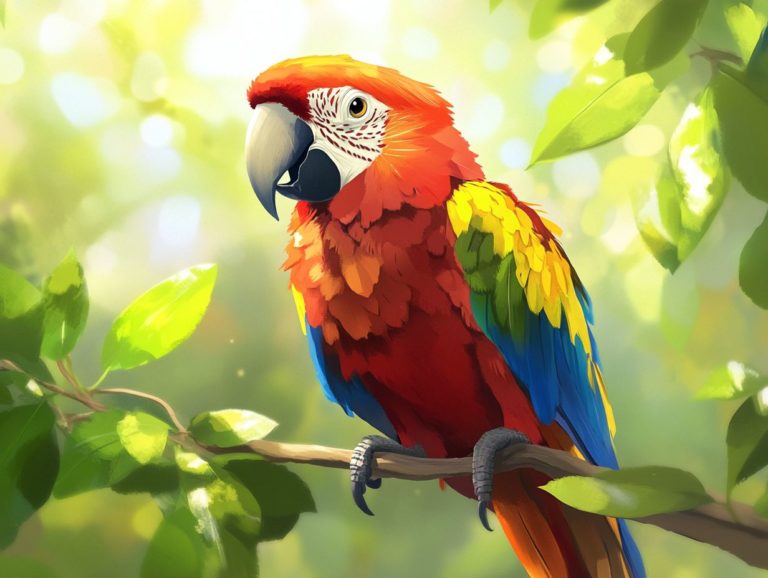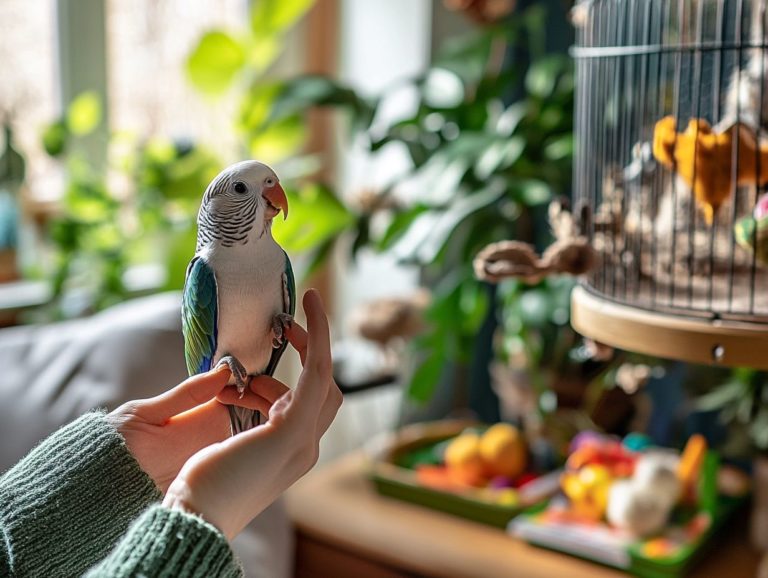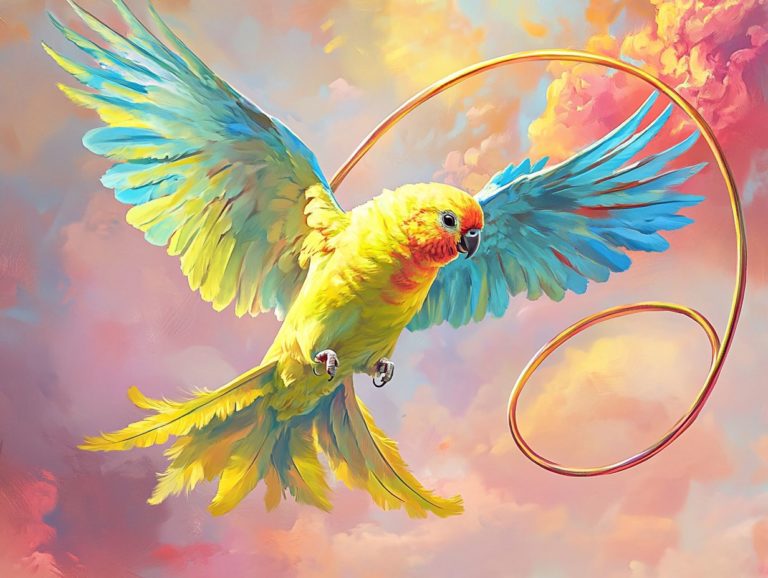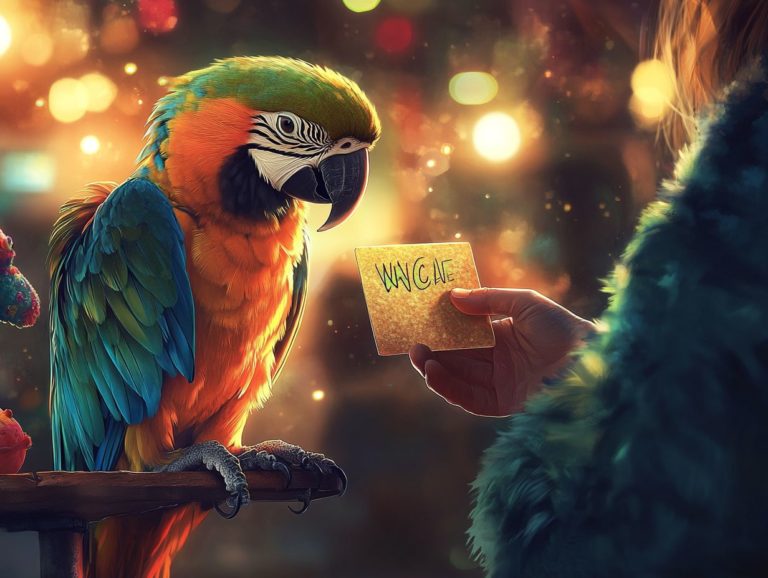Signs Your Bird Needs More Mental Stimulation
Birds, much like ourselves, flourish when their minds are actively engaged. Recognizing the importance of mental stimulation is essential for their overall well-being.
When your feathered friend lacks mental enrichment, you may notice significant behavioral and physical changes.
This article delves into the signs that indicate your bird might be feeling mentally under-stimulated. It provides practical strategies to enhance their environment and outlines common pitfalls to avoid.
Explore how nurturing mental engagement can result in a happier, healthier bird and strengthen the bond you share with your avian companion!
Contents
- Your Bird’s Mental Health Tips!
- Know Your Bird’s Needs
- Signs Your Bird is Lacking Mental Stimulation
- Ways to Provide Mental Stimulation for Your Bird
- Common Mistakes to Avoid
- Mental Stimulation Offers Amazing Benefits for Your Bird!
- Frequently Asked Questions
- What are some signs that my bird needs more mental stimulation?
- How can I provide mental stimulation for my bird?
- Why is mental stimulation important for birds?
- What are some DIY mental stimulation activities for birds?
- How often should I provide mental stimulation for my bird?
- What should I do if my bird seems uninterested in mental stimulation activities?
Your Bird’s Mental Health Tips!
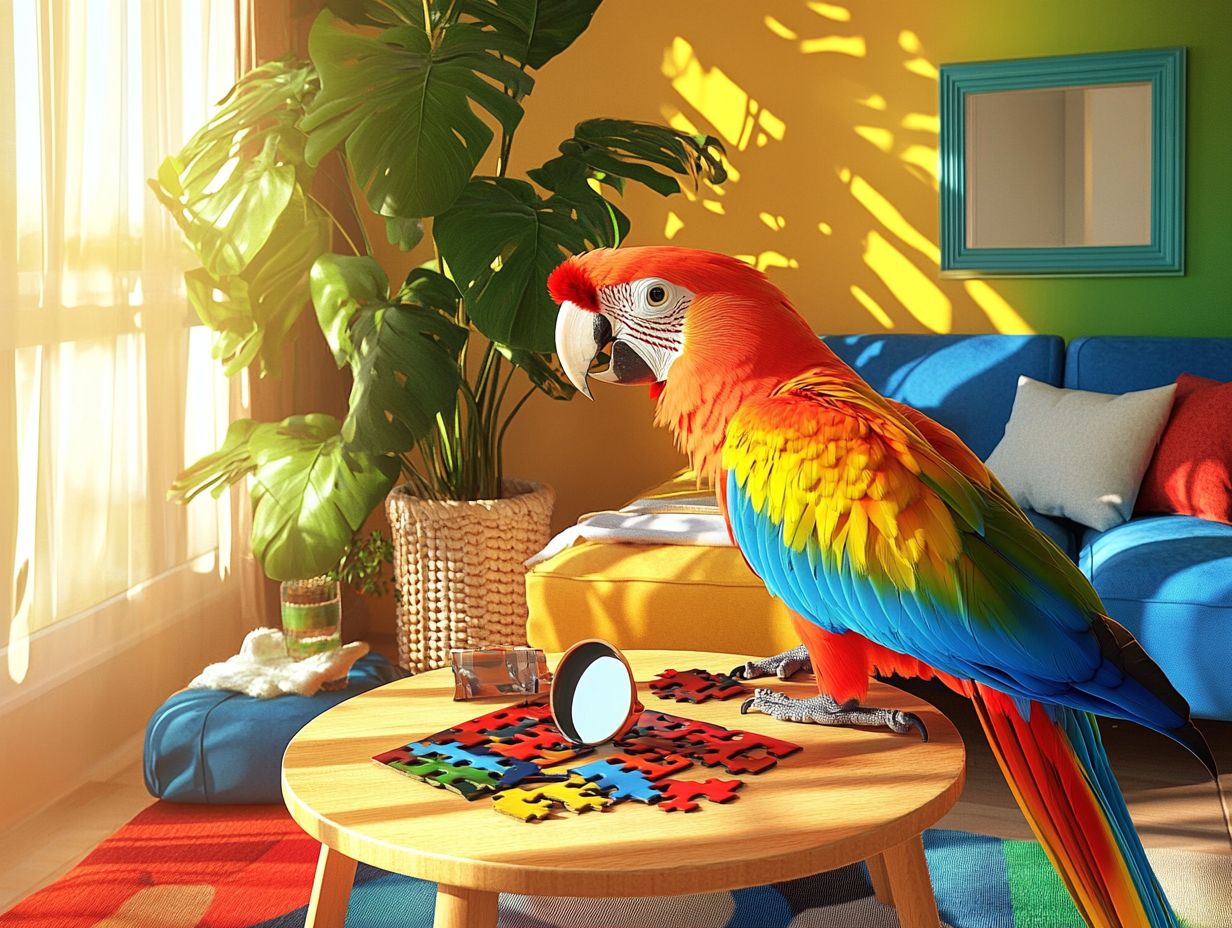
- Recognize behavioral changes in your bird to identify the need for more mental stimulation.
- Enhance your bird’s environment with toys, puzzles, and foraging fun!
- Avoid overwhelming your bird; pay attention to signs of stress.
Know Your Bird’s Needs
Understanding your bird’s needs is essential for ensuring its happiness and well-being. Whether your feathered companion is a parrot, cockatoo, or a captivating Eclectus or African gray, it requires more than just physical care; mental stimulation is key to its thriving.
The emotional and psychological health of your pet is intricately linked to its behaviors and interactions with you. Changes in its routine or environment can profoundly affect its appetite, stress levels, and overall demeanor, potentially leading to signs of anxiety or depression.
Therefore, recognizing these needs is your first step toward creating an enriching atmosphere that enables your bird to flourish.
Signs Your Bird is Lacking Mental Stimulation
You may notice various signs in your bird that indicate a lack of mental stimulation, which can lead to stress, anxiety, or even depression. Recognizing these signs is crucial, as they often reveal themselves through behavioral changes. If you’re looking to assess your bird’s readiness for further development, check out signs your bird is ready for advanced training, such as increased biting, excessive vocalizing, or self-harming behaviors.
A decreased appetite or a lack of interest in its surroundings can serve as clear indicators of your bird’s emotional state. Recognizing these signs is crucial for any bird owner, as they are directly tied to the overall health and well-being of your feathered friend.
Behavioral Changes
Behavioral changes in birds often signal that they’re experiencing stress or anxiety due to a lack of mental stimulation. You might notice excessive biting, increased vocalizations, or even self-harming behaviors, which can be distressing for both the bird and you. Recognizing these behaviors is essential for taking appropriate action.
When a bird feels overwhelmed, it may turn to destructive behaviors as a coping mechanism. Persistent feather plucking, for example, isn’t just an indicator of emotional distress; it also points to insufficient engagement in enriching activities.
By providing varied toys, social interactions, and opportunities for exploration, you can significantly reduce stress-related behaviors. Without proper mental challenges, birds can easily slip into a cycle of boredom and unease, potentially leading to serious issues like self-harming behaviors.
Observing your bird s habits can reveal crucial insights into its emotional state, enabling you to create a more stimulating environment that nurtures its well-being.
Start enriching your bird s life today! Your feathered friend will thank you!
Physical Changes
Physical changes in your feathered friend can often signal underlying health issues or stress from insufficient mental stimulation. One common indicator is a decreased appetite. If not addressed promptly, this can lead to further complications. By observing your bird closely, you can identify these changes early, allowing for necessary adjustments to its environment and routine.
These physical transformations might also show up as feather plucking or a noticeable drop in activity levels. You may notice increasing lethargy as well. Such alterations are significant; they can hint at deeper health concerns, reflecting a mind craving stimulation. Factors in your bird’s surroundings, like isolation or lack of social interaction, play a crucial role.
Your bird will thrive in dynamically stimulating environments. When their surroundings don t captivate them, it can profoundly impact their well-being. To promote a healthier mental and physical state, give your bird enriching toys, varied social interactions, and ample opportunities for exploration.
Ways to Provide Mental Stimulation for Your Bird
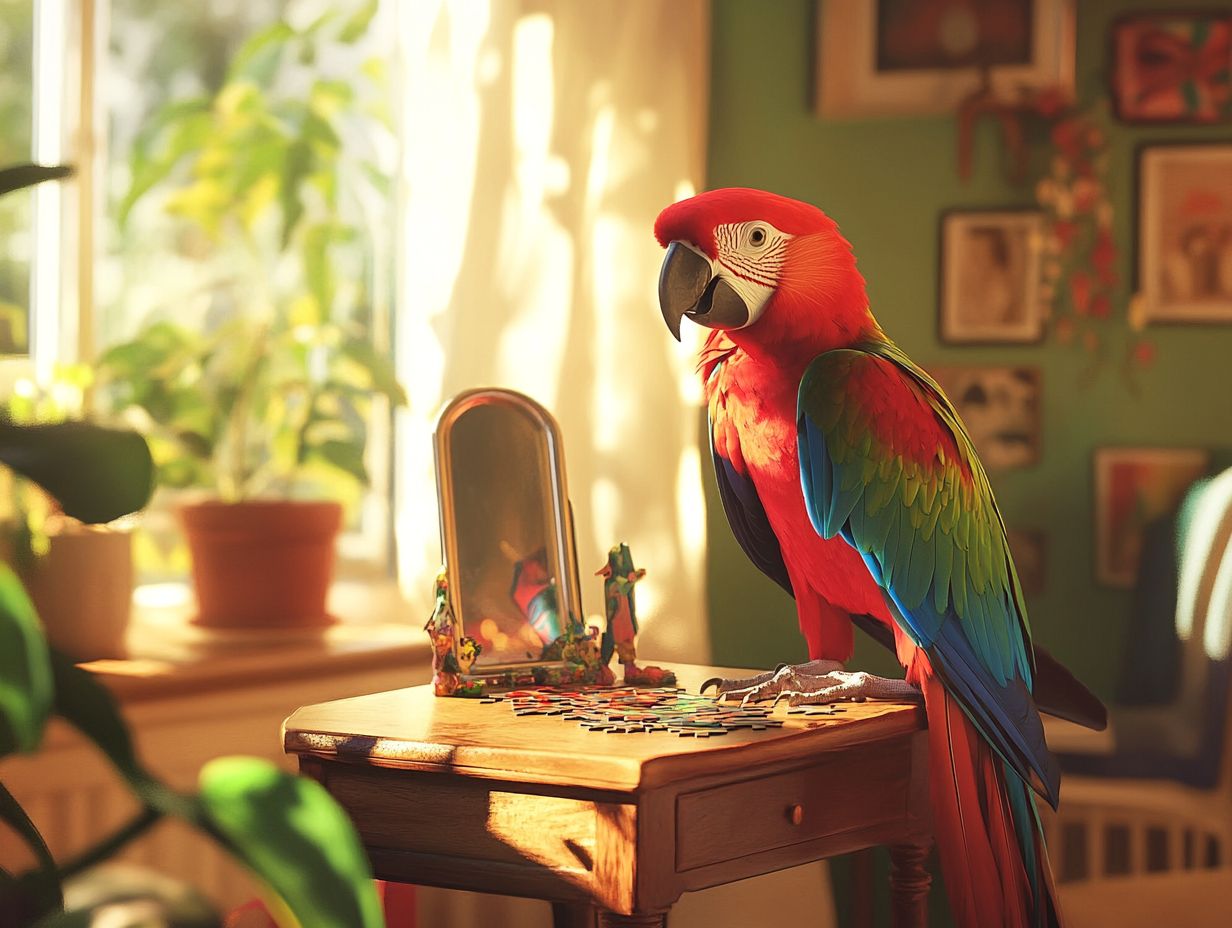
Providing mental stimulation for your feathered friend is crucial for its emotional and psychological well-being. Plenty of effective methods can accomplish this.
Provide a variety of toys, puzzles, and activities to keep your bird engaged and significantly reduce signs of stress or anxiety.
Incorporating training activities into your daily routine enhances your bond with your bird. This will promote a happier and healthier lifestyle for both of you.
Enriching the Environment
Enriching your bird’s environment is one of the most effective strategies for enhancing its mental stimulation and overall health. Provide a diverse array of toys, climbing structures, and interactive feeders to keep your feathered friend engaged and minimize boredom, which can often lead to undesirable behaviors.
The right blend of environmental elements creates a stimulating atmosphere where your bird feels secure and content. Incorporating natural materials like branches, leaves, and grass closely mimics their wild surroundings. This encourages instincts such as foraging and climbing.
Toys designed to promote problem-solving, like puzzles or shreddable items, offer entertainment and stimulate cognitive development.
Varying light exposure with natural sunlight or utilizing UV lights can significantly enhance vitamin D levels, a vital factor for overall wellness. These thoughtful modifications elevate your bird’s spirits and contribute to improved physical health, making them more active and vibrant in their daily pursuits.
Training and Bonding Activities
Training and bonding activities are delightful ways to enhance your relationship with your bird. They are essential for its mental stimulation as well. Engaging in training sessions that incorporate tricks or commands offers both physical and mental exercise, ultimately leading to improved health and behavior.
Consider incorporating interactive games, like hide-and-seek with treats or obstacle courses. These activities stimulate natural instincts and promote problem-solving skills. Regular socialization is key to helping your bird develop a well-rounded personality, reducing anxiety and encouraging healthier behaviors.
Calm and consistent interactions with your feathered friend yield emotional rewards. As the bond deepens, both of you will share joyful moments of playfulness. Over time, these shared experiences enhance overall well-being and foster a loving, trusting environment that benefits both you and your bird.
Common Mistakes to Avoid
Caring for a bird requires a keen awareness of common mistakes that could impede its mental stimulation and overall health. For instance, overstimulation can lead to anxiety and stress, while overlooking warning signs can further aggravate underlying issues.
By recognizing these pitfalls, you can cultivate a nurturing environment that enhances your bird’s well-being and fosters a harmonious bond between you both.
Over-stimulation
Over-stimulation in birds can lead to significant stress and negatively impact their behavior, affecting their overall health. You might notice signs of over-stimulation, such as increased vocalization, aggression, or withdrawal. These indicate that your bird might need a calmer environment. It’s crucial to keep an eye on these behaviors to prevent further emotional distress.
To create a calmer habitat, consider reducing loud noises and minimizing the number of toys. Allow for quiet time throughout the day.
Birds do well in places where they feel safe and secure, so incorporating hiding spots and perches at various heights gives them the option to retreat when they feel overwhelmed. Establishing a consistent routine can also help them adapt to their surroundings, thereby reducing anxiety.
Regular interaction is important, but ensure these moments remain positive and not overly stimulating. Think about implementing a variety of gentle environmental changes to foster a more serene atmosphere.
Don t Ignore the Red Flags!
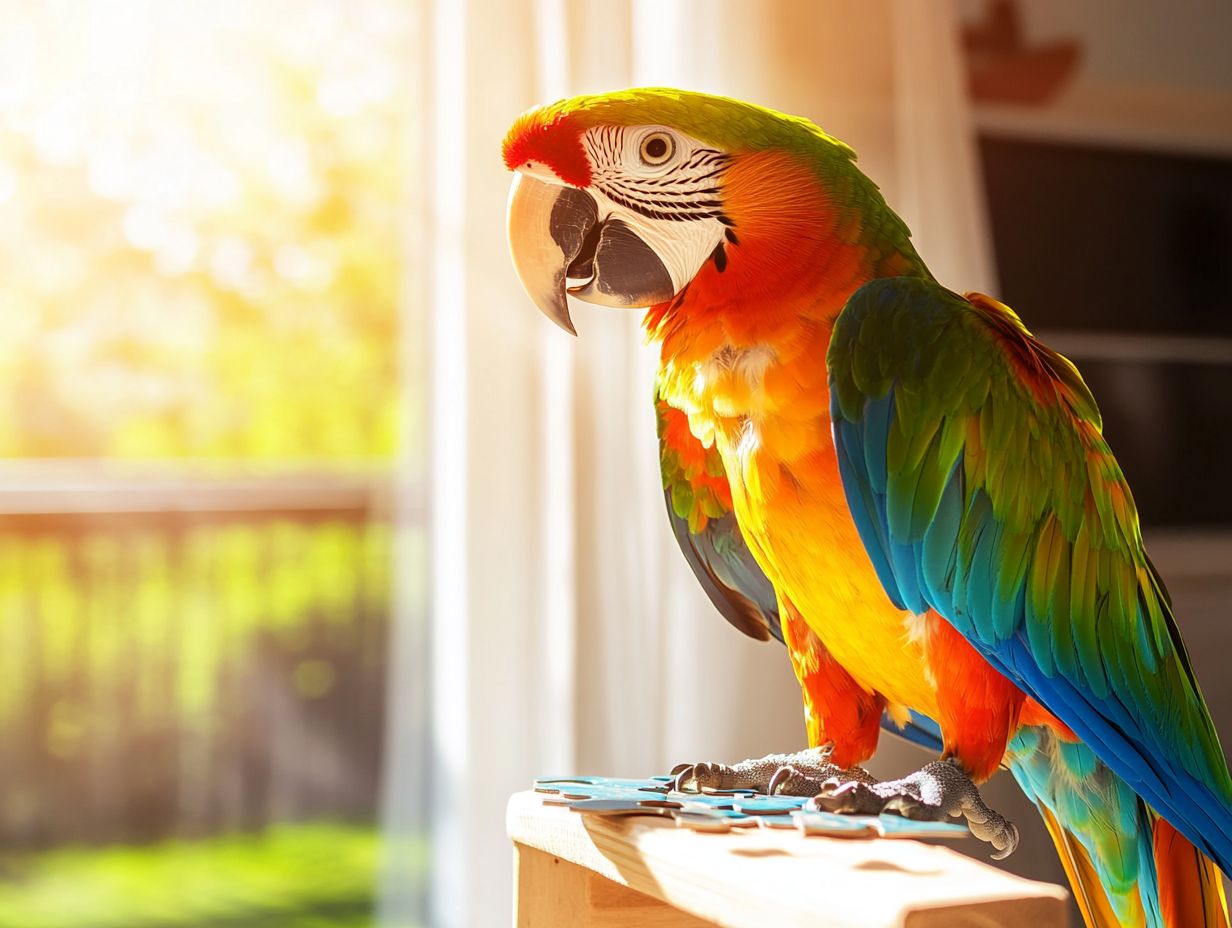
Ignoring warning signs in your bird can lead to serious health issues and behavioral problems down the road. Whether it s a decrease in appetite, increased biting, or altered vocalizations, these signs can indicate that your bird is feeling anxious or stressed. Acting quickly can reduce health risks and improve overall well-being.
Recognizing these subtle changes is crucial, as they often serve as early indicators of more significant underlying issues like lack of nutrients or stressful surroundings. For instance, a sudden reluctance to engage in typical behaviors may be your bird s way of signaling discomfort or illness, which could lead to severe consequences if left unaddressed.
By being vigilant and attentive, you can foster a healthier habitat, allowing for timely interventions when necessary. Ultimately, a proactive approach not only benefits your bird s immediate health but also enhances their overall happiness, strengthening the bond between you and your feathered friend.
Mental Stimulation Offers Amazing Benefits for Your Bird!
The benefits of mental stimulation for your bird extend far and wide, positively influencing both its health and behavior. By offering adequate mental challenges, you can significantly reduce stress, prevent anxiety, and encourage healthier interactions.
This enhanced mental engagement fosters a stronger bond between you and your bird, leading to a happier, more engaged pet that truly thrives in its environment.
Improved Behavior and Health
Improved behavior and health are significant benefits you can provide by offering mental stimulation for your bird. Engaging your feathered friend in mentally enriching activities helps reduce negative behaviors while promoting overall physical health. This holistic approach ensures that your bird is not just surviving but truly thriving in its environment.
By incorporating a variety of toys, puzzles, and interactive challenges into their daily routine, you can tap into the natural instincts and curiosity of birds. This kind of stimulation keeps their minds active and encourages physical exercise, which is crucial for maintaining a healthy weight and preventing obesity-related illnesses!
Regular mental challenges can also minimize stress and anxiety, leading to a more sociable and less aggressive bird. These positive changes contribute to a harmonious living environment and foster a stronger bond between you and your pet.
Make these changes today to see your bird thrive!
Enhanced Bonding and Communication
Enhanced bonding and communication between you and your bird are key advantages of mental stimulation. Engaging in shared activities fosters trust and companionship. This helps you understand each other better. As you invest time in these bonding activities, your bird becomes more attuned to your presence and behaviors.
Participating in activities like puzzle-solving or interactive games stimulates your bird’s intellect and strengthens the emotional connection you share. These playful interactions encourage your bird to express itself, revealing preferences and emotions that deepen your bond. Cognitive games, which involve problem-solving tasks, can even spark dialogues in your avian friend’s unique language, enhancing their communication skills.
By nurturing their curiosity and providing diverse experiences, your bird learns to trust you more. Transform every moment into an exciting adventure for enrichment and companionship!
Frequently Asked Questions
What are some signs that my bird needs more mental stimulation?
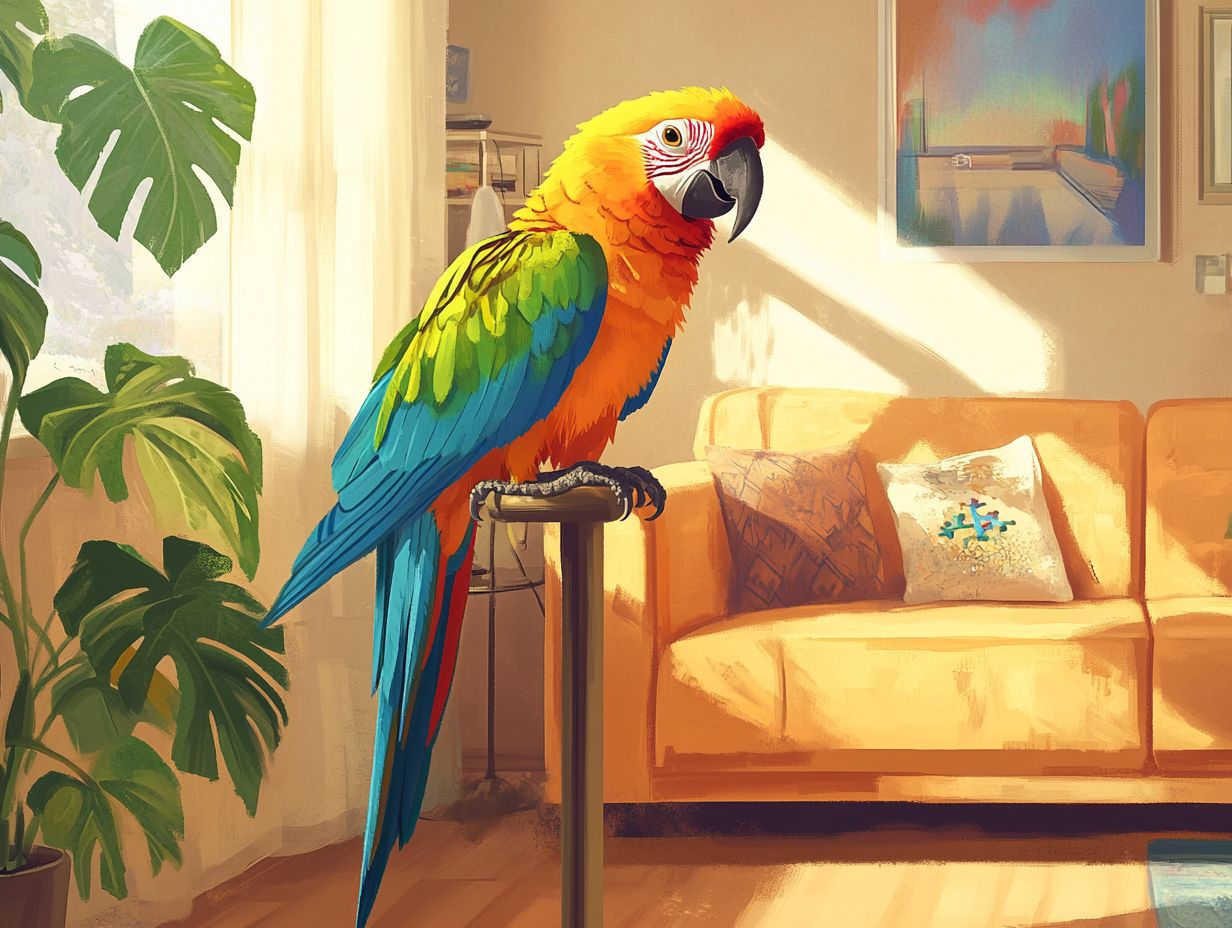
Some signs include excessive feather plucking, repetitive behaviors, increased aggression, and vocalization. These behaviors indicate that your bird may be bored and needs mental enrichment. To learn more about this, check out what the signs of a bored bird are.
How can I provide mental stimulation for my bird?
There are many ways to provide mental stimulation for your bird. Introduce new toys, puzzles, and foraging activities. You can also rotate their toys regularly to keep them engaged and interested.
Why is mental stimulation important for birds?
Mental stimulation is crucial for a bird’s overall well-being. It helps prevent boredom, which can lead to destructive behaviors and health problems. It also promotes natural behaviors and keeps their minds active and engaged.
What are some DIY mental stimulation activities for birds?
You can create homemade foraging toys using items like paper towel rolls, paper cups, and cardboard boxes. Hide treats around their cage or create a “treasure hunt” by hiding favorite toys in various places for them to find.
How often should I provide mental stimulation for my bird?
It is recommended to provide mental stimulation for your bird daily, even multiple times a day. This can include both interactive playtime with you and independent activities in their cage.
What should I do if my bird seems uninterested in mental stimulation activities?
If your bird is not showing interest in mental stimulation activities, try introducing new toys or changing up their routine. Ensure that the toys and activities you provide are appropriate for your bird’s species and size.

